加泰罗尼亚本地学生对摩洛哥裔同龄人的语言文化适应偏好。语言同化的决定因素
IF 2.1
1区 文学
Q2 EDUCATION & EDUCATIONAL RESEARCH
引用次数: 0
摘要
摘要作为对上世纪末在加泰罗尼亚(西班牙)发起的移民运动的回应,其教育体系旨在促进跨文化和使用多种语言,以此实现社会凝聚力。为此,重要的是要提高我们对当地学生对移民学生的语言文化适应偏好的理解,这是一个几乎没有研究过的因素。实现这些目标的主要因素之一是当地学生对移民学生的语言文化适应偏好,这一点几乎没有得到研究。本研究采用349份问卷,分析了当地高中生对莱里达(西班牙加泰罗尼亚)摩洛哥裔同龄人语言文化适应情况的决定因素和语言文化适应偏好。主要结果表明,按频率顺序,同化加泰罗尼亚语、同化西班牙语加泰罗尼亚语和多语是当地学生认可的三种语言偏好。多项逻辑回归模型发现了以下决定因素:对少数民族语言的态度、对多语主义的态度、西班牙语的自我认同、教师使用西班牙语和同学使用加泰罗尼亚语。这些结果突出了在学校环境中进一步促进少数民族语言的使用和融入的重要性和必要性,这是一种可能的方式,可以增加多语言偏好的构建,解构偏见和刻板印象,最终实现社会凝聚力。本文章由计算机程序翻译,如有差异,请以英文原文为准。
Linguistic acculturation preferences of Catalan local students toward their peers of Moroccan descent. The determining factors of linguistic assimilationism
ABSTRACT As a response to the migratory movements initiated at the end of the past century in Catalonia (Spain), its educational system aims to promote interculturality and multilingualism as a way to achieve social cohesion. For this purpose, it is important to improve our understanding of the linguistic acculturation preferences endorsed by local students toward students of immigrant origin – a scarcely studied factor. One of the main factors for achieving these objectives, that has been scarcely studied, is the linguistic acculturation preferences endorsed by local students toward students of immigrant origin. The present study applied 349 questionnaires to analyze the determining factors and linguistic acculturation preferences of local high-school students regarding the linguistic acculturation profiles of their peers of Moroccan descent in Lleida (Catalonia, Spain). The main results showed that, in order of frequency, assimilation to Catalan, assimilation to Spanish-Catalan and multilingualism were the three linguistic preferences endorsed by local students. The multinomial logistic regression model found the following determining factors: attitudes toward minority languages, attitudes toward multilingualism, Spanish self-identification, Spanish use with teachers and Catalan use with classmates. These results highlight the importance and need to further promote the use and embracement of minority languages in school settings as a possible way to increase the construction of multilingual preferences, and deconstruct prejudices and stereotypes to ultimately achieve social cohesion.
求助全文
通过发布文献求助,成功后即可免费获取论文全文。
去求助
来源期刊
CiteScore
4.10
自引率
4.80%
发文量
19
期刊介绍:
The International Multilingual Research Journal (IMRJ) invites scholarly contributions with strong interdisciplinary perspectives to understand and promote bi/multilingualism, bi/multi-literacy, and linguistic democracy. The journal’s focus is on these topics as related to languages other than English as well as dialectal variations of English. It has three thematic emphases: the intersection of language and culture, the dialectics of the local and global, and comparative models within and across contexts. IMRJ is committed to promoting equity, access, and social justice in education, and to offering accessible research and policy analyses to better inform scholars, educators, students, and policy makers. IMRJ is particularly interested in scholarship grounded in interdisciplinary frameworks that offer insights from linguistics, applied linguistics, education, globalization and immigration studies, cultural psychology, linguistic and psychological anthropology, sociolinguistics, literacy studies, post-colonial studies, critical race theory, and critical theory and pedagogy. It seeks theoretical and empirical scholarship with implications for research, policy, and practice. Submissions of research articles based on quantitative, qualitative, and mixed methods are encouraged. The journal includes book reviews and two occasional sections: Perspectives and Research Notes. Perspectives allows for informed debate and exchanges on current issues and hot topics related to bi/multilingualism, bi/multi-literacy, and linguistic democracy from research, practice, and policy perspectives. Research Notes are shorter submissions that provide updates on major research projects and trends in the field.

 求助内容:
求助内容: 应助结果提醒方式:
应助结果提醒方式:


